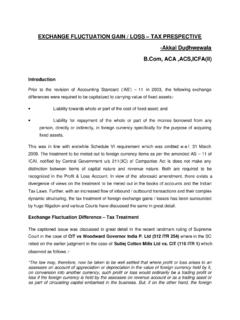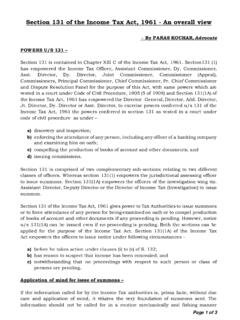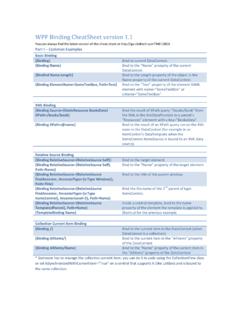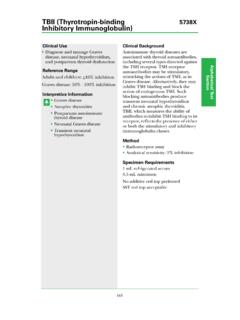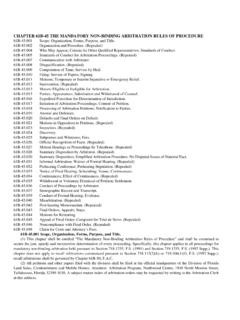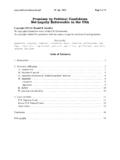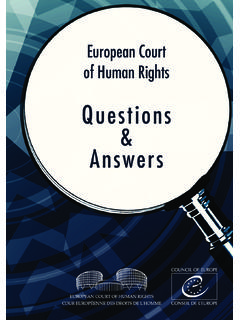Transcription of BINDING FORCE OF JUDICIAL PRECEDENTS
1 JUDICIAL PRECEDENTS THEIR BINDING FORCE AND THEIR REVIEW By Subash Agarwal, Advocate 1)Doctrine of Stare decisis Stare decisis" is a latin phrase which means "to stand by decided cases" or "to uphold PRECEDENTS ". Doctrine of Stare decisis is a general maxim which states that when a point of law has been decided, it takes the form of a precedent which is to be followed subsequently and should not normally be departed from. The hon'ble Madras High Court in Peirce Leslie & Co. v. CIT [1995] 216 ITR 176 observed that the doctrine of stare decisis is one of the policy grounded on the theory that security and certainty require that accepted and established legal principal, under which rights may accrue, be recognised and followed, though later found to be not legally sound, but whether a previous holding of the court shall be adhered to, or modified, or overruled is within the Court's discretion under the circumstances of case before it.
2 The above observation of the Madras High Court underscores two important aspects of the doctrine of stare decisis. One, it imparts security and certainty in the legal system of the country in the sense that it becomes more stable and predictable. Non observance of this doctrine would, in fact, lead to chaos. Everybody would be than seen interpreting the law according to his whims and fancies. Lawyers would be a confused lot not knowing how to advise their clients. Courts would be in quandary while delivering judgements and the general public would be in a dilemma as to what is the correct position of law-whether to obey or not to obey it and ultimately the whole judiciary would lose its credibility.
3 The other aspect that is highlighted is the limitation of this doctrine. Hon'ble High Court states that a JUDICIAL precedent may in certain circumstances, more particularly when it is not based on legally sound principals, be departed from at the discretion of the court. 2)Decisions of the Supreme Court By virtue of Article 141 of the Constitution of India, the judgements pronounced by the hon'ble Supreme Court have the FORCE of law and are BINDING on all courts in India. However, the Supreme Court itself is free to review its earlier decision and depart from it if the situation so warrants. 3)High Court decisions- whether BINDING in nature and BINDING on whom Though there is no express provision in the Constitution like article 141, in respect of the High Courts, the Tribunals within the jurisdiction of a High Court are bound to follow its judgements as the High Court has the power of superintendence over them under article 227 of the Constitution.
4 The hon'ble Supreme Court in East India Commercial Co. Ltd. v. Collector of Customs AIR 1962 SC 1893 observes - " We therefore, hold that the law declared by the highest court in the state is BINDING on authorities or Tribunals under its superintendence and they cannot ignore it." The Apex Court reiterated the aforestated position once again in Baradakanta Mishra v. Bhimsen Dixit AIR 1972 SC 2466 where it stated that it would be anomalous to suggest that a Tribunal over which a High Court has superintendence can ignore the law declared by it and if a Tribunal can do so, all the subordinate courts can equally do so, for there is no specific provision as in respect of Supreme Court, making the law declared by the High Court BINDING on subordinate Courts.
5 The court further observed that it is implicit in the power of supervision conferred on a superior Tribunal that all the Tribunals subject to its supervision should confirm to the law laid down by it. If the Tribunals defy their jurisdictional High Court, there would be confusion in the administration of law and respect for law would irretrievably suffer. Emphasising the need of following the judgements of the High Courts by the Assessing Officers, the Allahabad High Court in K. N. Agarwal v. CIT [1991] 189 ITR 769 observes- "Indeed, the orders of the Tribunal and the High Court are BINDING upon the Assessing officer and since he acts in a quasi JUDICIAL capacity, the discipline of such functioning demands that he should follow the decision of the Tribunal or the High Court, as the case may be.
6 He cannot ignore merely on the ground that the Tribunal's order is the subject matter of revision in the High Court or the High Court's decision is under appeal before the Supreme Court. Permitting him to take such a view would introduce JUDICIAL indiscipline, which is not called for even in such cases. It would lead to a chaotic situation". The hon'ble High Court went a step further in State of v. CTO (1988) 169 ITR 564, where it pronounced that it is not permissible for the authorities and the Tribunals to ignore the decisions of the High Court or to refuse to follow the decisions of the High Court on the pretext that an appeal is pending in the Supreme Court or that steps are being taken to file an appeal.
7 The court then made the following important and bold observations- " If any authority or the Tribunal refuses to follow any decision of the High Court on the above grounds, it would be clearly guilty of committing contempt of the High Court and is liable to be proceeded against." 4)Position in regard to different benches of the same High court The position is as follows- -A single Judge or a Division Bench order of a High Court is BINDING on the single judge of the same High Court. -It is obligatory on the part of a Division Bench to follow the decision of another Division Bench of equal strength or a full Bench of the same High Court. -Where a Single Judge does not subscribe to the views expressed in a Single Judge's order or Division Bench's order of the same HC, he should place the papers before the Chief Justice to enable him to constitute a larger Bench to examine the question.
8 -Similarly where a Division bench differs from another Division Bench of the same High Court, it should refer the case to a larger Bench. The above summerised position has been culled out from CIT v. Thana Electricity supply Ltd. [1994] 206 ITR 727 (Bom.) Other High Courts and the Supreme Court have expressed similar views. -Law of PRECEDENTS is that a decision of the Division Bench given in an earlier case is BINDING on a subsequent Bench. CIT v. Hari Nath & Co. (1987) 168 ITR 440 (All.) - JUDICIAL propriety requires single Judge to follow and apply earlier Division bench Judgement of same court which is very much BINDING on him sitting as a single Judge of the same High Court Super spinning Mills Ltd.
9 V. CIT (1993) 199 ITR 832 (Mad.) -So long as the Full Bench Judgement stands, the dicta laid down therein are BINDING on all courts including single judges and Division benches of that High Court Koduru Venkata Reddy v. LAO [1988] 170 ITR 15 (AP) - JUDICIAL decorum and legal propriety demand that where a learned single judge or a Division Bench does not agree with the decision of the Bench of Co-ordinate jurisdiction, the matter shall be referred to a larger Bench. It is subversion of JUDICIAL process not to follow this procedure. Sundarjas Kanyalal Bhatija v. Collector [1990] 183 ITR 130 (SC) 5)Whether BINDING FORCE of decision of a High Court extends beyond its territorial jurisdiction The Bombay High Court in CIT v.
10 Thana Electricity Supply Ltd. (Supra) had the occasion to examine this question, more particularly in the light of confusion created by the judgement rendered by the same court in CIT v. Jayantilal Ramanlal & Co.[1982] 137 ITR 257 wherein it was observed- "We are aware that the practice is not uniform among the High Courts, but nevertheless we are of the opinion that it is a desirable one. Unless the judgement of another High Court dealing with an identical or comparable provision can be regarded as per incuriam it should be ordinarily followed". ( Note:A decision of a court is per incuriam when it is given without its attention having been drawn to the relevant authorities or statutes). The Court held that the observations in Jayantilal's case leave no scope for doubt that the court merely observed what according to it is desirable and did not intend to lay down any principle of law making the decisions of other High Courts BINDING PRECEDENTS for another Court.

